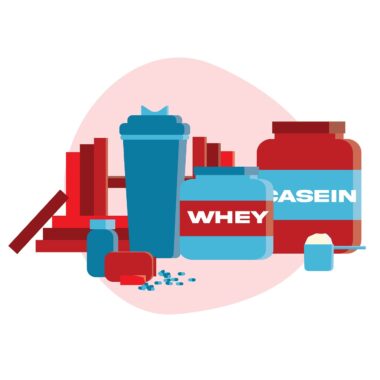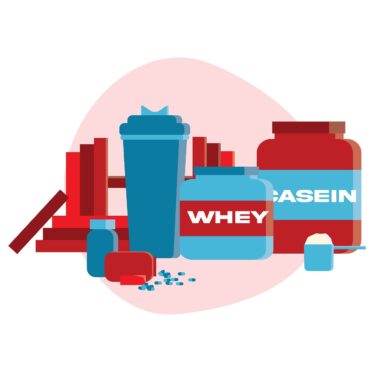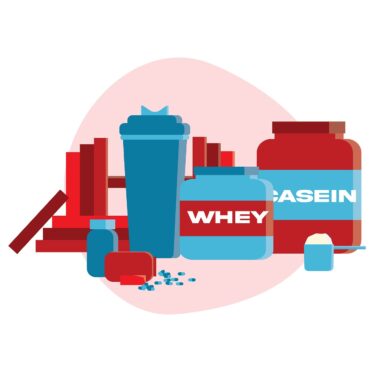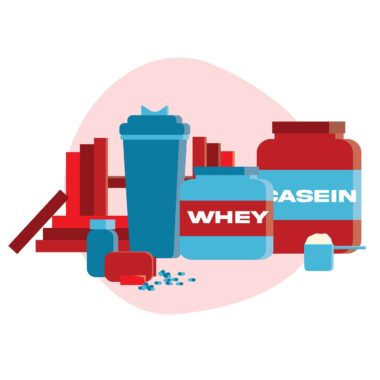Whey vs. Casein: Which Protein Powder is Best?
When it comes to protein powders, whey and casein remain two of the most popular options on the market today. These proteins are derived from milk and offer a variety of benefits for those looking to supplement their diets. When evaluating whey protein, it is essential to note that it is rapidly digested and absorbed by the body. This quick absorption makes whey an excellent option for post-workout recovery, as your muscles require immediate nutrients to repair themselves after intensive workouts. Many athletes prefer whey due to its high bioavailability and the speed at which it can help them recover. On the other hand, casein protein digests more slowly, providing a steady release of amino acids into your bloodstream over a longer period. This characteristic makes it ideal for nighttime use to help prevent muscle breakdown during sleep. Both protein types contain essential amino acids and are beneficial for muscle recovery and growth, making them valuable additions to any athlete’s supplementation regime. Choosing between whey and casein depends largely on your individual goals and timing of consumption.
The choice between whey and casein protein can also be influenced by dietary preferences, as both types come in various formulations. For instance, whey protein is often available in two main forms: whey protein concentrate and whey protein isolate. Whey concentrate contains some fat and lactose, which can make it creamier and tastier, while whey isolate is nearly pure protein with minimal fat and lactose. This makes whey isolate an excellent choice for those who may be lactose intolerant or looking for a lean protein option. Casein, following suit, also has its variations, from micellar casein to hydrolized casein, catering to different preferences and absorption rates. The flavor profile is another pertinent aspect to consider when selecting your protein powder. Whey tends to have a more favorable taste, making it a popular choice for smoothies and shakes. However, casein’s distinct texture can thicken shakes or yogurt, which some users may appreciate for its more satisfying mouthfeel.
Protein Quality and Nutritional Value
Both whey and casein are complete proteins, meaning they contain all nine essential amino acids necessary for muscle repair and growth. However, there are some notable differences in the amino acid profiles of these two protein types. Whey protein is particularly high in branched-chain amino acids (BCAAs), especially leucine, which plays a crucial role in stimulating muscle protein synthesis. This makes whey an ideal choice for athletes and those looking to increase muscle mass post-workout. On the other hand, casein’s slow-digesting nature means it provides a steady supply of amino acids over time, making it an excellent supplement for muscle maintenance and repair during longer periods without food. When it comes to choosing between the two, consider your specific fitness goals, as well as your workout routine. If you need quick fuel post-exercise, whey may be the better option, whereas casein is more suitable for sustained recovery when eaten before bed.
It is also essential to consider how your nutritional needs may vary based on your individual lifestyle and training regimen. In some cases, it may even be beneficial to incorporate both whey and casein protein into your diet for optimal results. For example, you might use whey protein immediately after workouts to replenish your energy quickly and support muscle recovery. Then, you might take casein protein before bed to ensure that your body has a supply of amino acids available overnight, aiding in muscle maintenance and growth while you rest. This dual approach maximizes the benefits of both protein types while catering to your body’s unique requirements. Additionally, protein timing and quantity should be considered, as consuming enough protein throughout the day is critical for anyone aiming to build muscle. Generally, aim for a balanced intake of protein across meals to ensure consistent amino acid availability for muscle protein synthesis.
Price and Availability
When selecting between whey and casein protein powders, cost and availability are also worth mentioning. Whey protein tends to be more accessible and often sold at a lower price point compared to casein. This could be due to the higher demand for whey as a quick and effective post-workout option. However, prices can vary significantly based on brand and quality. Premium brands may charge more but offer added benefits like higher protein percentages and lower sugar content. On the other hand, casein protein powders can be pricier, primarily because they involve a different manufacturing process and are typically considered more premium products. For those on a budget, it may be wise to explore where to purchase these supplements at the most affordable price point without compromising quality. Online retailers, local health stores, and supermarkets usually have options available. Always check the ingredient list for added fillers or sugars that might break your nutritional goals.
Ultimately, both whey and casein protein powders provide exceptional nutritional benefits to support athletic performance and recovery. The choice between them can come down to personal preferences, specific fitness goals, and dietary restrictions. Furthermore, when deciding on your protein powder, obtaining high-quality sources from reputable brands matters significantly. Look for third-party testing or certifications to ensure that what you’re consuming is safe and effective. You may also want to consider consulting a healthcare provider or nutritionist for personalized advice that aligns with your specific health goals. Regardless of your protein choice, incorporating quality protein powder into your diet can complement your training regimen and help you achieve optimal results in muscle building and recovery. Keep in mind that protein powders should supplement your diet and are not replacements for whole food sources of protein that offer additional nutrients beneficial to your overall health.
Final Thoughts
In conclusion, both whey and casein protein powders come with their respective benefits and drawbacks. It is essential to weigh these factors based on your specific goals and dietary preferences. If your focus is on muscle recovery and growth after workouts, whey’s rapid digestion may offer the best solution. However, if you value prolonged amino acid availability for muscle repair during sleep or longer intervals without food, then casein could be the better alternative. Be sure to consider the flavor, form, and nutritional content of the products you are evaluating. Ultimately, your protein choice should work in harmony with your overall dietary and fitness strategies. By integrating the right protein powder into your routine, you’re not just supplementing; you’re enhancing your performance, recovery, and long-term health.
Before finalizing your decision, it’s also wise to experiment with both protein types in your daily routine. This will help you understand how they affect your body and its response during workouts. Pay attention to how you feel after consuming either protein and whether it enhances your performance or recovery. Trying different brands and flavors may also contribute to a more enjoyable supplementation experience. Remember that individual responses to different protein powders can vary widely, so don’t be discouraged if one doesn’t work as well as expected. Take the time to listen to your body and make an informed choice that aligns with your nutritional and fitness goals.








